What’s new in the world of SEO? How can your company use this strategy to connect with its target audience and make sales? And what specific challenges will keep you from doing so?
These are the kinds of questions I wanted answers to. But I didn’t want to scour the internet, only to find years-old information. Instead, I took matters into my own hands and ran an SEO survey for 2024. What I learned was both enlightening and somewhat surprising.
Keep reading to learn where people get their SEO information in 2024, the strategies they like to use (and how successful they are), common challenges they face, the most popular SEO software, and more. We have a lot to get to, so let’s get started!
A Quick Note On Survey Participants
Before I dive into my SEO survey findings, I want to talk about the folks who participated. Who are these good people, what SEO qualifications do they have, and how do they deploy their skill sets? Here’s a quick rundown of my SEO survey participants in 2024:
First, I polled 280 people, of which 134 met my criteria and were included in my research.
Next, 65.34% of survey participants are between the ages of 30 and 60, with just over half of them (33.57%) clocking in at 45 years or older. Another 19.49% of participants are between the ages of 18 and 29, while 15.16% of them are at least 60 years old.
As for gender, 54.15% of participants are female, and the remaining 45.85% are male.
When it comes to professional roles, 26.87% of survey participants claim to be business owners, 21.64% are marketing professionals, 20.15% are content creators, and 18.66% are SEO specialists. 12.69% of participants fall into an indiscriminate “none of the above” category.
What about experience levels? When asked, “How would you describe your level of experience with SEO?” 43.28% of survey participants said “Intermediate”, 26.87% said “Advanced”, and 22.39% said “Beginner”. An additional 7.46% answered this question with “Expert”.
What This Means: As you can see, my survey participants run the gamut. This speaks to the widely known power of search engine optimization. Many people want to know how to build effective SEO campaigns—not just digital marketers.
Where Do People Get Their SEO Information?
Now, let’s dig into the actual SEO insights that I was able to uncover with this survey.
The first thing I wanted to find out was where people learn about SEO. So I asked them, “What are your primary sources of SEO information?” and gave them nine options to select from.
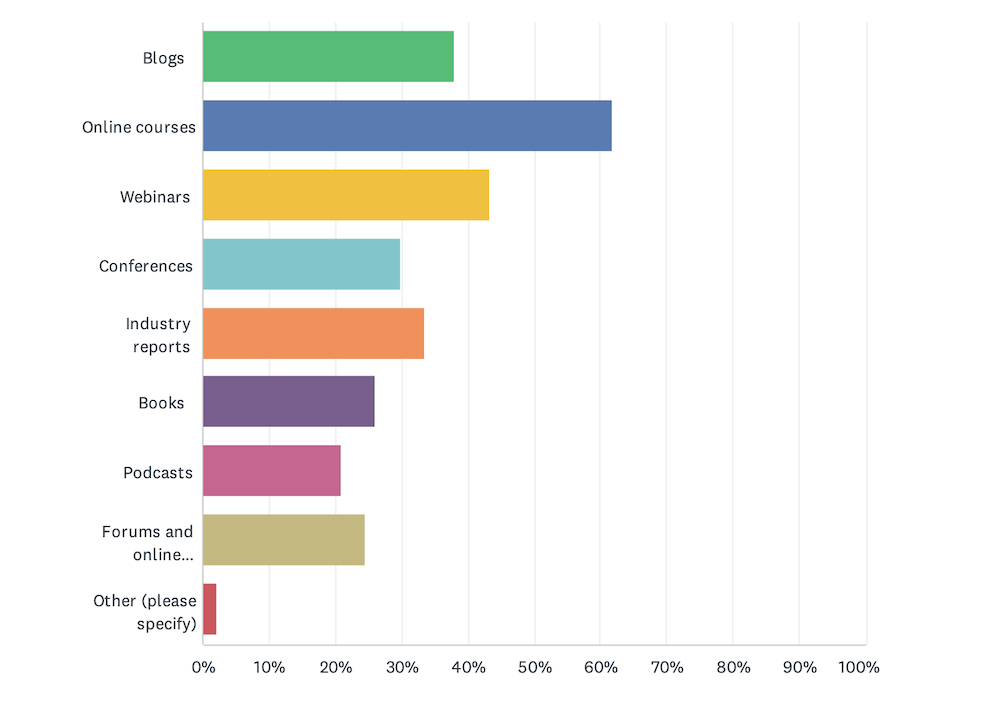
The majority of participants, 61.94% to be exact, claim to learn about SEO from online courses. 43.28% of participants have attended SEO-related webinars and 38.06% of participants get SEO information from blogs. Rounding out the top five, 33.58% of participants read industry reports and 29.85% attend conferences to level up in this field.
What This Means: As mentioned above, the power of SEO is widely understood. Because of this, many people will pay for quality information via online courses and conferences. That doesn’t mean free information has gone by the wayside, however. Blogs and webinars are popular channels for SEO information, too, and a great introduction to the topic.
Which SEO Strategies Are the Most Popular in 2024?
What about tactics? I was curious to learn which SEO strategies are most popular in 2024. And more importantly, whether these strategies actually work. Here’s the survey data:
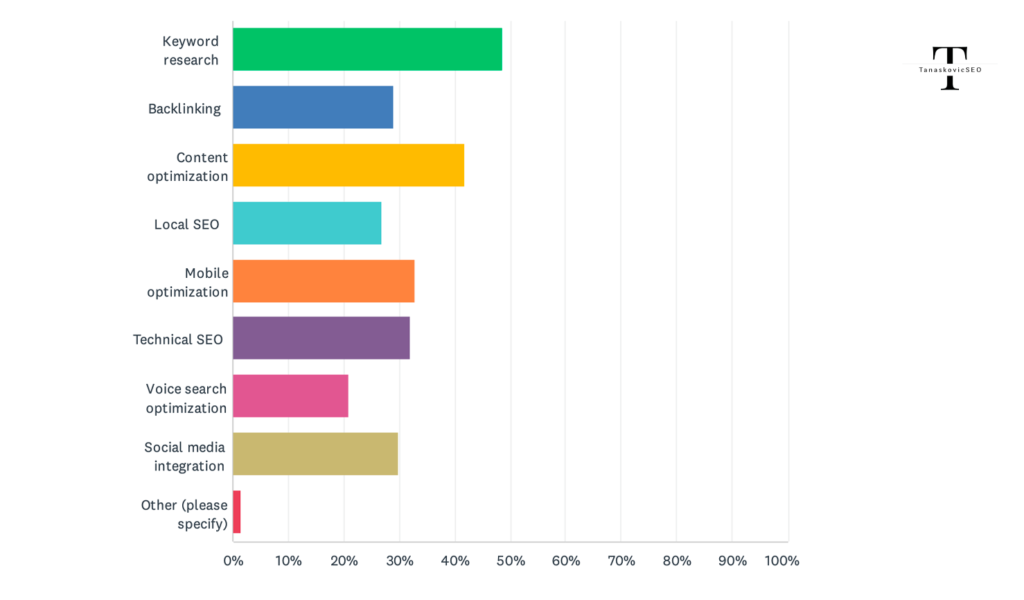
Most marketers use keyword research and content optimization tactics. In fact, 48.51% and 41.79% of survey respondents use these respective SEO strategies.
In addition, 32.84% of participants use mobile optimization techniques, 32.09% of participants engage in technical SEO best practices, and 29.85% of participants integrate their social media.
Unfortunately, only 20.15% of those who use these strategies say they’re “Very Effective”. In fact, 50.75% of participants, a slight majority, find them to be either “Neutral”, “Somewhat Effective”, or “Very Ineffective”. This is obviously less than ideal.
(I should mention, the most popular answer to this question was “Somewhat Effective”. A full 29.10% of survey respondents answered the question this way.)
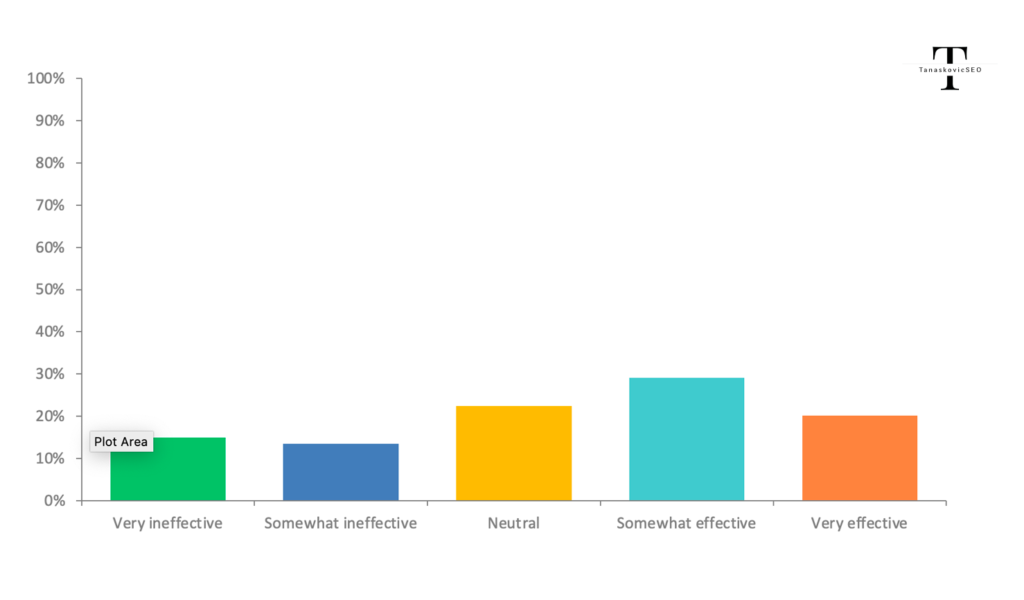
What This Means: Keyword research and content optimization techniques are obviously important, but they aren’t differentiators. A majority of companies use these tactics to support their SEO campaigns. This is probably why 50.75% of those surveyed say their SEO efforts aren’t very effective.
To find success in the competitive world of search engine optimization, companies need to invest in lesser-used strategies, like backlinking and voice search, in addition to the standard keyword and content optimization tactics they already use.
Also, social media integration will be critical in 2024. Google isn’t the only relevant search platform these days. TikTok and YouTube have become relevant search engines, too. Companies must use them to reach their target audiences and boost search results.
Common Challenges Associated With SEO
SEO is a fantastic opportunity, but it’s not without its challenges. I wanted to know which challenges affect our industry the most. So I did the smart thing and asked survey participants:
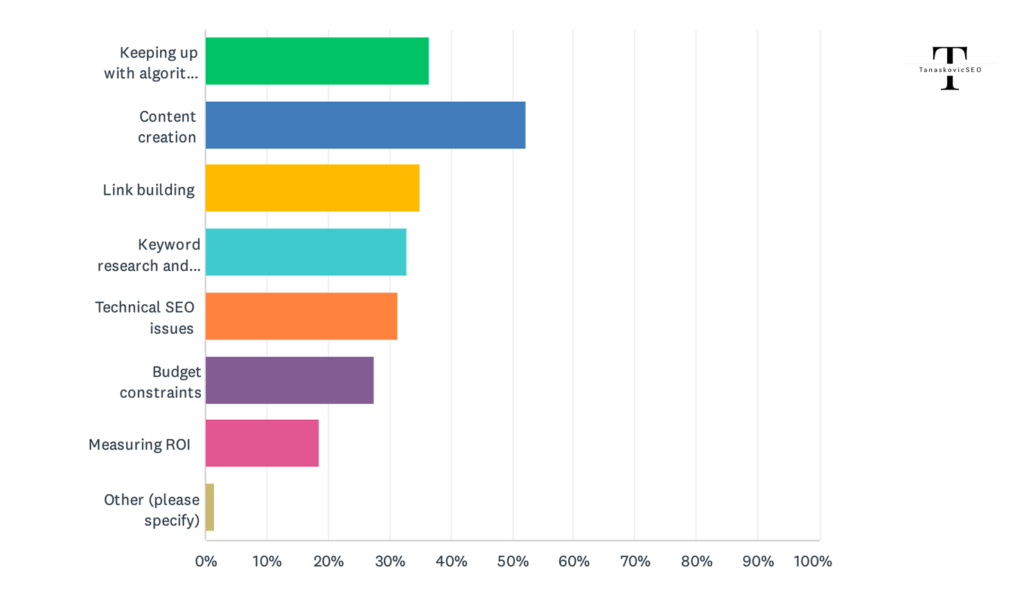
The biggest challenge that my SEO survey participants face is content creation. 52.24% of respondents struggle with this—almost 16% more than the next closest answer.
36.57% of participants struggle with algorithm changes, which makes sense. Experts say Google adjusts its algorithm thousands of times a year.
Other common challenges relate to link building (35.07%), keyword optimization (32.84%), and technical SEO (31.34%). Surprisingly, only 27.61% of survey respondents struggle with budget constraints, which was quite a bit lower than I expected.
What This Means: The majority of survey respondents struggle to create content, but only 27.61% of respondents have budget constraints. In my mind, more companies should partner with respected marketing agencies and/or freelancers to improve their content marketing efforts.
This is especially true given the rise of generative AI and the many poor articles now on the internet. Professionals who can produce amazing, expert-driven content will be able to cut through the noise, build trust with their target audience, and make more sales.
As an added bonus, many marketing agencies and freelancers can also help manage algorithm changes, find new backlinks, search for relevant keywords, and solve technical SEO issues. This means the potential ROI of their SEO services is likely too great to ignore.
The Most Popular SEO Tools
Have you ever asked an SEO expert what their favorite tool is? If so, you probably got more than you bargained for. We SEOs love our tools and can talk about them for hours.
Luckily, you won’t have to endure that. Instead, look at the results of my SEO report, which includes data about popular SEO software:
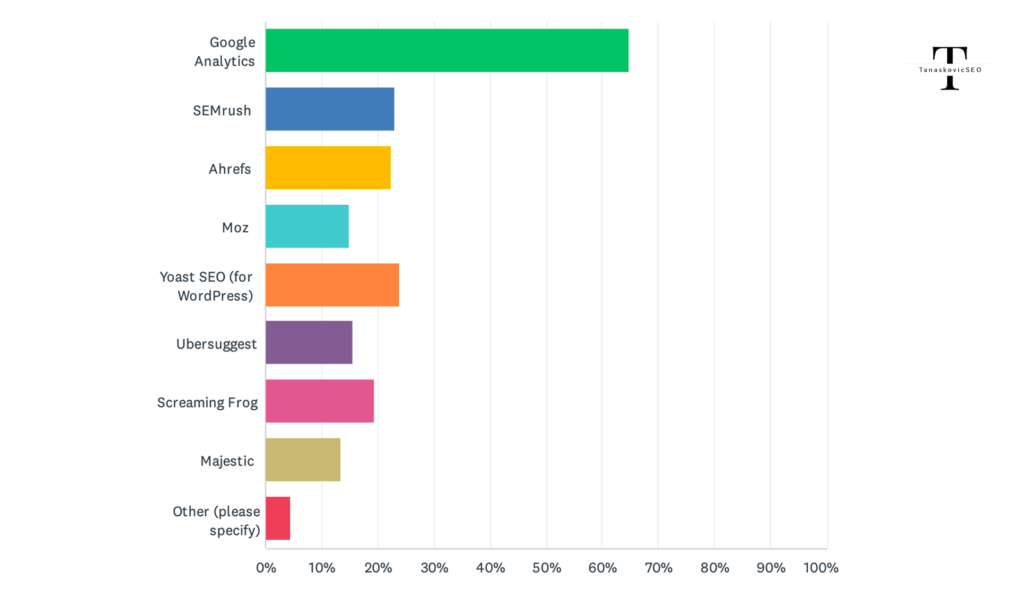
The survey data is clear: more people in our industry use Google Analytics than any other tool. Honestly, it wasn’t even close. While 64.93% of survey respondents use Google Analytics, only 23.88% use Yoast SEO (for WordPress), the second most popular solution.
Also of note, 23.13% of participants use Semrush and 22.39% of participants use Ahrefs. Both of these apps are advanced tools that require a relatively significant investment.
Interesting, right? Knowing which tools people use to achieve their SEO results is cool. But I took things a step further. I wanted to know how satisfied users were with their SEO tools.
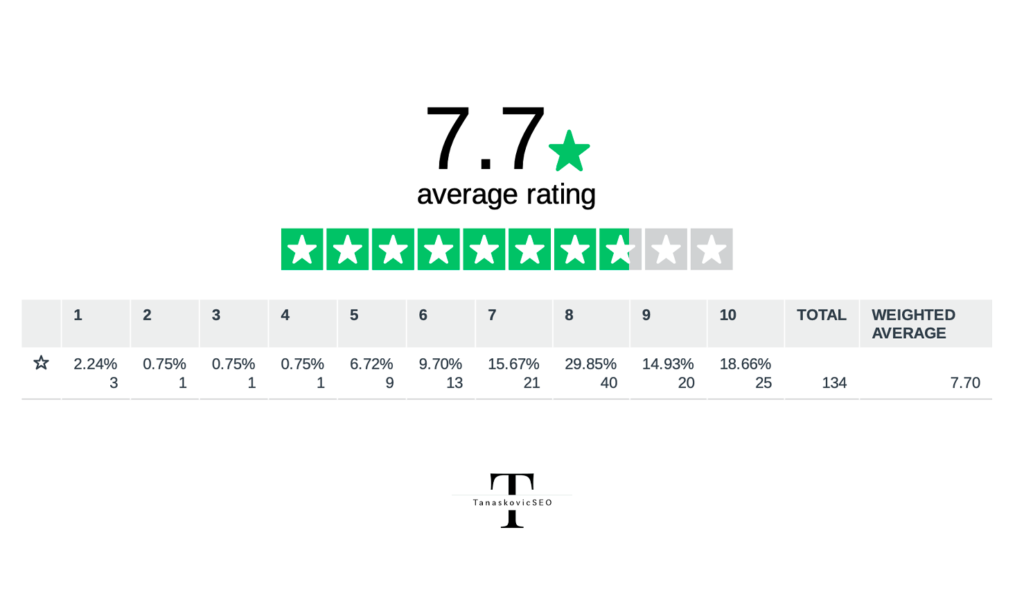
When asked, “How satisfied are you with [your SEO] tools on a scale of 1 – 10?” a large majority of respondents, 79.11% to be precise, gave their chosen apps a score of seven or greater. In other words, people who use SEO tools tend to be pretty happy with them. Nice!
What This Means: It’s clear that most people understand the importance of SEO tools. And many of them are willing to pay for access to the best ones.
At the very least, a majority of those in the SEO industry will spend their valuable time learning to use free tools. This statement is proven by the fact that 64.93% of respondents use Google Analytics, which isn’t the easiest app in the world to master.
(Note: Looking for another free tool to help improve your SEO results? Take Google Search Console for a spin. It can do wonders for your company’s SEO strategy, assuming you use it the right way, of course.)
Common SEO Budgets and ROI
There was one more thing I wanted to learn with my SEO survey: how much do companies spend on their SEO strategy? And how do they measure their success? Here’s what I found out:
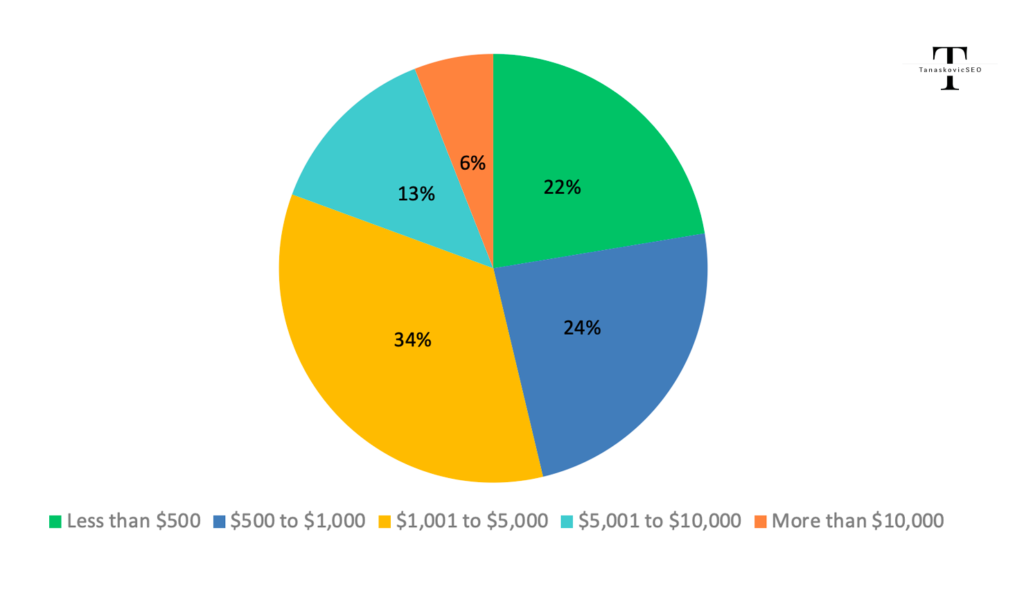
22.39% of survey respondents spend less than $500 a year on SEO, while 23.88% of participants spend between $500 and $1,000. Another 34.33% of participants spend between $1,000 and $5,000. Only 5.97% of participants spend more than $10,000 annually on SEO related initiatives. This was a surprise to me.
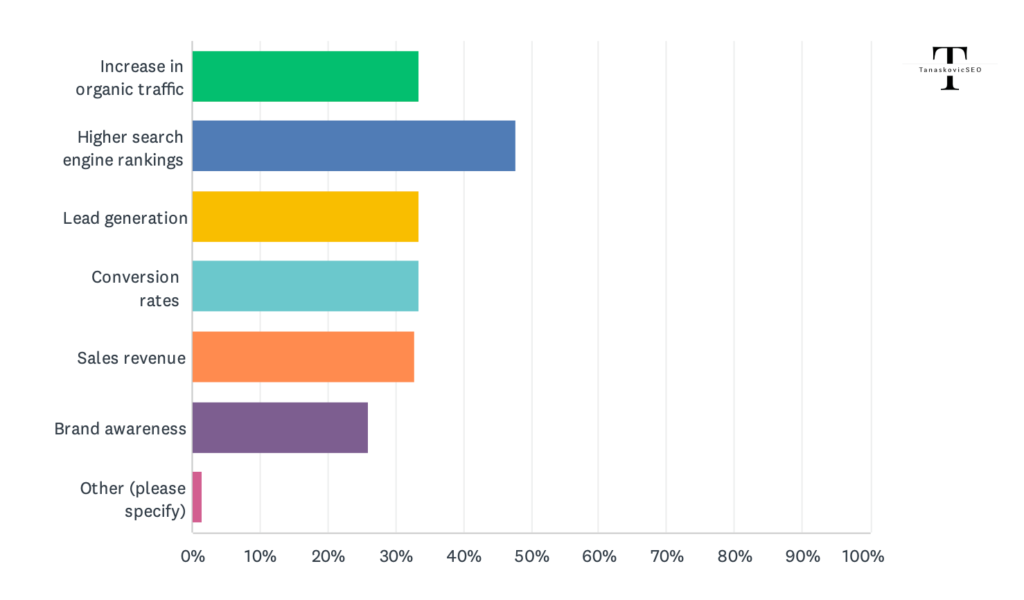
Continuing on, 47.76% of survey respondents analyze search engine results to measure their SEO efforts. In other words, the higher their content ranks, the better they feel about their SEO strategy.
Of course, keyword rankings aren’t the only valuable metric. 33.58% measure ROI by the increase in organic traffic their website gets. And another 33.58% of respondents measure it by lead generation. A final 33.58% of respondents track conversion rates to assess their SEO efforts.
What This Means: After looking at the results of my SEO survey, there seems to be a disconnect between the value respondents place on SEO and the amount of money they invest in it. Why else would survey participants be willing to spend so little?
In my opinion, those who are serious about their SEO strategy should spend over $10,000 a year on SEO. This translates to about $833 a month. So, it’s not a minor expense, but it’s not prohibitive to most companies, either—especially if they generate quality leads.
So, take a serious look at the top-rated SEO tools. Or partner with a marketing agency or freelance writer to generate quality content. Or hire a virtual assistant (VA) to supercharge your backlinking strategy. The investment will likely benefit your brand.
Finally, I believe most businesses should measure their SEO efforts in different ways. While traffic-related metrics are fun to look at, they don’t mean much in the grand scheme of things.
Instead, measure metrics that directly relate to your company’s bottom line. The number of leads generated and the number of sales made both qualify. (Note: These metrics will be critical as zero-click searches and Google search generative experience [SGE] rise in popularity.)
Improve Your SEO Strategy in 2024
There you have it, the results of my SEO report, 2024 edition.
I hope you found the information above useful. Or, at the very least, interesting. I know I sure did, and was surprised by a few of my findings. Let’s recap the top takeaways:
- SEO is a widely accepted marketing strategy. Many different professionals use it to connect with and engage their target audiences.
- People receive SEO information from a variety of sources—many of them paid. This reinforces the idea that SEO information is valuable to modern businesses.
- Keyword research and content optimization strategies will always be important. But they aren’t the only things you should focus on. Techniques related to backlinking, voice search, and social media integration will help you climb search engine rankings.
- Most companies struggle to create quality content. Sound familiar? Partner with a marketing agency or freelancer, who can help you craft must-read content at scale.
- There are a bunch of popular SEO tools on the market, but none are more popular than Google Analytics. Generally speaking, those in this industry are satisfied with their tools.
- Lastly, most companies don’t allocate enough budget to their SEO strategy. They don’t track the right metrics either. Give your brand a leg up and spend $10,000+ per year on SEO. Then measure lead and sales oriented metrics.
Want more actionable insights to level up your company’s SEO strategy? Sign up for my newsletter and learn how to boost rankings, drive organic traffic, and generate qualified leads!

Leave a Reply
You must be logged in to post a comment.